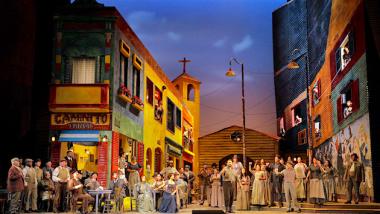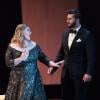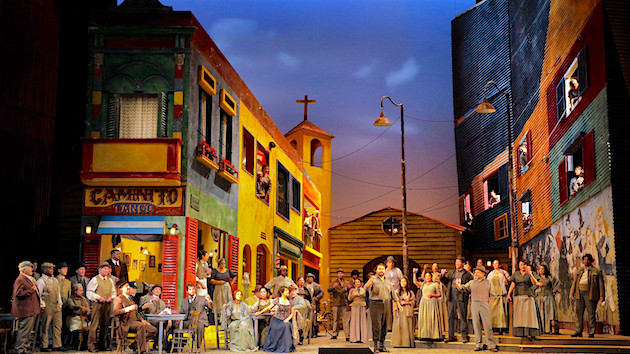
There is only reason to open the season of a world-respected opera house with the double bill of Cavalleria Rusticana/Pagliacci: You’ve got singers who can drive the tragic outcomes of those two potent potboilers across the footlights and into people’s hearts. In verismo operas that demand powerhouse artists who get so carried away by passion that they hurl themselves forward without a net, anything less is destined to fall flat.
San Francisco Opera’s impressively knowledgeable, dressed-to-the-hilt, opening night audience of Sept. 7 reacted to the bloody close of Pietro Mascagni’s Cav with tepid applause. Nor did Ruggiero Leoncavallo’s Pag give them any reason to reconsider their judgment.
Part of the responsibility lay with director Jose Maria Condemi, who was handed responsibility for renewing an intriguing production by tenor José Cura that premiered in Liège in 2012. Cura’s concept, which pays tribute to Argentina’s Italian immigrants of the early 1900s, moves the action to La Boca, the Italian quarter of Buenos Aires. Inspired by a mural that, in 1999, briefly covered a wall at the entrance to the district, Cura modeled Pagliacci’s characters after the mural’s curious assemblage of circus performers and drag queens.
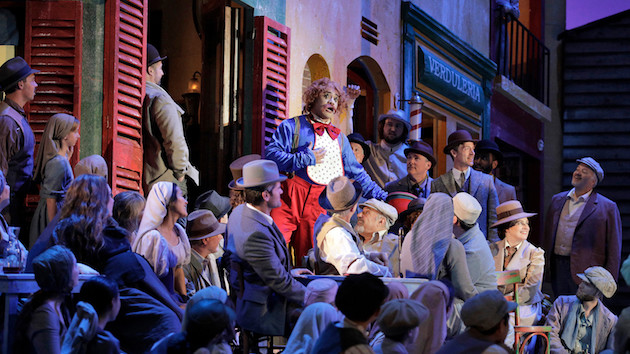
Cura also unified the one-acters by starting with Cavalleria rusticana (Rustic chivalry), and then preceding Pagliacci’s prologue with a funeral procession for Cavalleria’s murdered Turridu (Roberto Aronica). Characters reappear, as Turiddu’s casket is followed by his lover Santuzza (Ekaterina Semenchuk) and mother Mamma Lucia (Jill Grove). Santuzza’s married rival, Lola (Laura Krumm), also reappears in Pagliacci, gazing at action that in multiple ways mirrors the tragedy she unwittingly instigated in Cavalleria. Cura even has Mascagni and Leoncavallo appear onstage, with the latter doubling as Tonio (debuting Dimitri Platanias, who played Alfio in Cavalleria.)
It all makes sense when you see it, especially in Cura’s strikingly attractive, colorful set. Some of Condemi’s directions, however, made less sense. In Pagliacci, for example, he committed the literal travesty of having two overly active transvestites strike pose after pose alongside Nedda (Lianna Haroutounian) as she sang her glorious “Stridono lassù,” (Screeching up in the sky) near the opera’s start. To so hamper Haroutounian, who was magnificent in 2016's Madama Butterfly, in her role debut as Nedda was inexcusable.
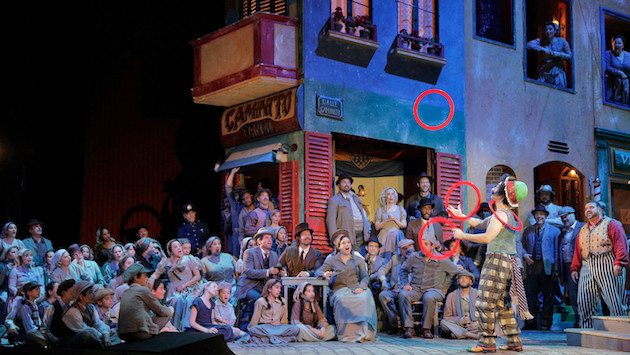
Worse were the endings of both operas, where breaks of several seconds between fatal stabbings, final vocal lines, and orchestral climaxes halted dramatic thrust. As cast members stood relatively frozen, all energy collapsed. When Mamma Lucia (Jill Grove), who has been reincarnated in Cura’s Pagliacci as the owner of Lucia’s bar, proclaimed “La commedia è finita”(The comedy is over), the audience had already spent several seconds waiting for the curtain to close. It was canned tragedy at its worst.
Among the singers in these potent arguments for moderate consumption of alcohol, Semenchuk had some powerful moments as Santuzza, especially in the opening of her prayer. What she lacked, however, were the tears in the voice and idiomatic command of tempo that make for a memorable Santuzza. Her deranged appearance, with hair askew, compounded her inability to arouse sympathy.
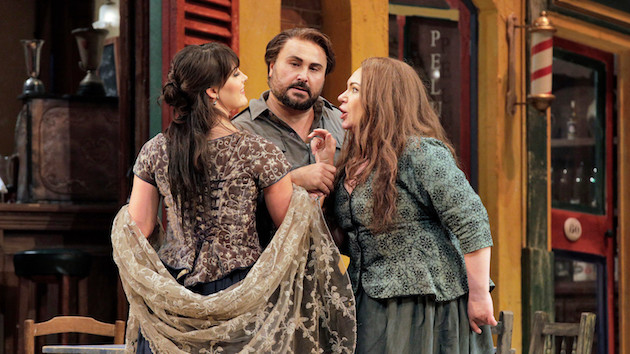
Ditto for Aronica in his role debut as Turiddu. The voice remains wonderful — strong and gleaming on top, if a bit too straight ahead for the graceful opening Siciliana — but it lacked wrenching drama. Grove sounded as fine and powerful as ever in her role debut, but mostly delivered stock gesture rather than commitment. As Lola, Laura Krumm looked every bit the seducer, and sang well. But when she got caught in the act, she looked as though she didn’t know what to do.
As Alfio and Tonio, debuting baritone Dimitri Platanias initially sounded bottled up and edgy. The voice soon opened to reveal an impressively dark, ominous, but ultimately monotonous sound. There was plenty of power and metal on top, but save for one glorious money note, Platanias came across as more visually apt (especially as Tonio) than engaging. The Pagliacci Prologue’s potential as one of the great baritone statements of Italian opera was not fulfilled.
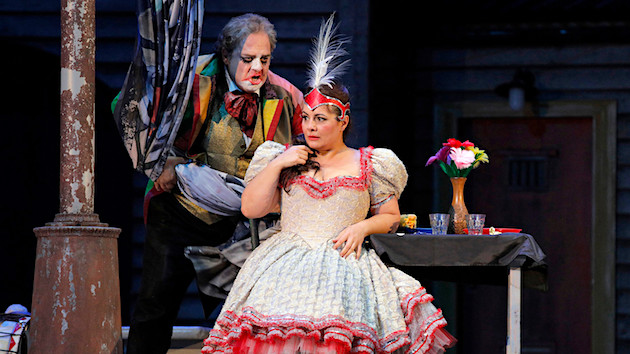
Haroutounian acted convincingly and charmingly, and at one point opened the top of her voice to display a glorious range of colors. But lower in the range, she lacked the freshness you associate with Nedda. (She also lacked “Stridono lassù”’s opening trills, but so did the great Claudia Muzio, who sang the role in the War Memorial Opera House’s opening season.) Whenever Haroutounian was given sufficient space to sing on her own, she shone. Given her brilliance as a singing actress, I expect that she will soon make Nedda her own.
As Canio, Marco Berti was predictable. His highs remain gloriously bright, invincible, and gleaming, but his sincere efforts to bring pliability to his opening scene and sympathy to his character clarified that he is not a tragic clown for the ages. That said, Berti was certainly stronger that his tenor rival Silvio (David Pershall), whose lack of power and eloquence were disappointing.
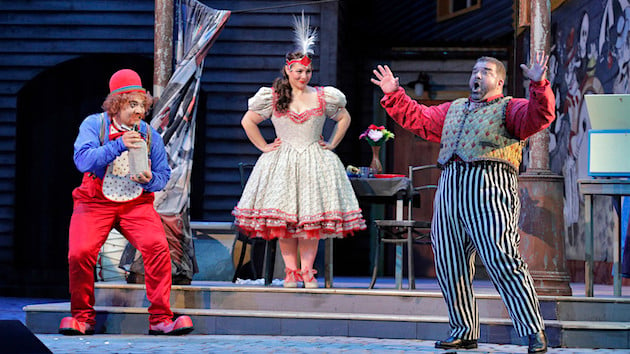
Without question, the standout artist of Pagliacci was Adler Fellow Amitai Pati, who sang Beppe’s Serenade with the lightness, grace and beauty of the great Tito Schipa. Of everyone onstage, only Pati sounded absolutely right for his part.
Debut conductor Daniele Callegari coaxed many memorably touching lyrical moments from his orchestra but fell short of fire when fire was called for. He and the singers also stuck to metronomic straight time in arias that demanded the passion that bends bar lines. Had everyone obeyed the music’s command, they had the potential to take these one-acters over the top. Instead, they gave us grand opera at its less than grandest.

